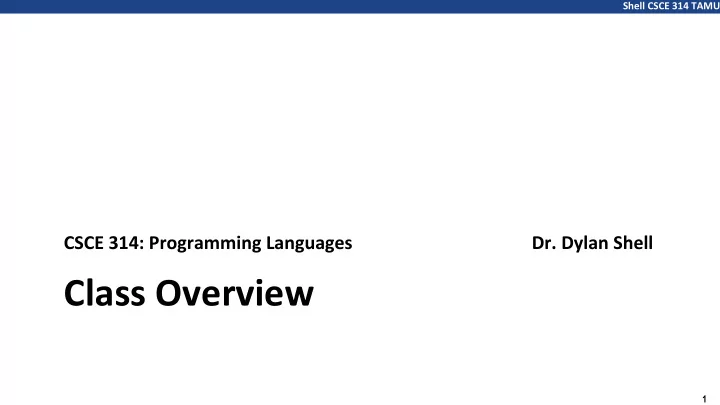

Shell CSCE 314 TAMU CSCE 314: Programming Languages Dr. Dylan Shell Class Overview 1
Shell CSCE 314 TAMU CSCE 314: Programming Languages ● Course Homepage: http://robotics.cs.tamu.edu/dshell/cs314/ ● Textbooks: 1. Programming in Haskell, Graham Hutton, Cambridge University Press (Second Edition) 2. The Java Programming Language, 4th Ed, Ken Arnold, James Gosling, and David Holmes, Addison- Wesley Professional http://www.informit.com/store/java-programming-language-9780321349804 ● Other reading material: See course homepage 2
Shell CSCE 314 TAMU CSCE 314: Programming Languages ● CSCE 221 (?) ● CSCE 222 (not official, but desirable) ● Responsibility ● Familiarity with recursion ● Familiarity with complexity analysis ● Eager to learn (Energy and enthusiasm) ● Perseverance and positive, constructive thinking ● ... 3
Shell CSCE 314 TAMU Motivation for the course ● Ever increasing complexity and the size of modern computer programs ● Ever increasing time and cost of program development ● Ever increasing requirements on the correctness of the programs ● Ever increasing need for a better programmer who learns new languages easily! 4
Shell CSCE 314 TAMU “We shape our tools, and then our tools shape us.” Marshall Mcluhan (or John Culkin?) 5
Shell CSCE 314 TAMU Course Objectives (1) Understand the fundamental concepts of the programming languages: ➢ Broader understanding of language constructs, common abstraction mechanisms, and efficiency consideration ➢ Understanding of the basics of how programs written in high-level programming languages are executed, i.e., parsing, internal program representation, type checking, interpretation 6
Shell CSCE 314 TAMU Course Objectives (2) Understand the fundamental concepts of the programming languages: ➢ Effective use of the functional programming approach to design and implement programs ➢ Understanding of the main features of modern object-oriented languages ➢ (Towards) Encouraging the use of formal verification 7
Shell CSCE 314 TAMU Further introductions Flemming Andersen, Ph.D. Formerly Principal Engineer and formal verification manager at Intel. Managed the formal verification (FV) of the RTL in the Xeon-Phi processors. The main focus is on arithmetic verification since we never want to encounter a new FDIV bug like the one that cost Intel almost $500 million in 1994. Mengyuan Chao (TA) Has a great deal of a experience in working with Haskell; his dissertation research deals with networking, he has published papers on QoS for IP networks. 8
Shell CSCE 314 TAMU Edwin A. Abbott’s Flatland Read it, its free! https://ebooks.adelaide.edu.au/a/abbott/edwin/flatland/ 9
Shell CSCE 314 TAMU Course Outline (1) Language Processing ● Grammars, lexing and parsing ● Abstract syntax, internal representations ● Types and type checking ● Interpretation ● Basics of an implementation of a simple programming language 10
Shell CSCE 314 TAMU Course Outline (2) Study of a Functional Language — Haskell ● Type inference ● Parametric polymorphism ● Higher-order functions ● Algebraic data types ● Abstract data types and modules ● Type classes ● Effects in a “pure” language 11
Shell CSCE 314 TAMU Course Outline (3) Study of a Functional Language — Java ● Subtyping and inheritance, subtype polymorphism ● Exception handling ● Generics, wildcards ● Reflection ● Concurrency 12
Shell CSCE 314 TAMU Grading Midterm Examination: 40% (In class) Final Examination: 60% (Reserved final slot) ⬛ The final examination will be comprehensive Examinations will be closely related to problems posted as homework. For both exams students are permitted 5 pages of notes. * The honors section for this course will have an additional assignment that will account for 15% of their grade; the two exams will be scaled proportionately. 13
Shell CSCE 314 TAMU Homeworks ● Homework will be posted approximately fortnightly. ● Best attempt the assignments individually; if you need help, ask your friends. If approached, help! ● Problems may involve material that is being covered or is to be covered, but the majority will use material already discussed. ● Much of the in-class discussion will build on material in the homework. 14
Shell CSCE 314 TAMU Collaboration Policy ● Best attempt the assignments individually; if you need help, ask your friends. If approached, help others! ● Use piazza: post, reply, discuss... ● Help is available from peer teachers. ● Manufacture circumstances using social pressures to get homework completed. 15
Shell CSCE 314 TAMU Earning grade in this course ▪ Planning to get an “A” grade? Attend all classes, pay attention and participate in the class, do the homework exercises , help others, read book and reading material, participate in class. ▪ How to get a “D” grade? Miss classes, do not pay attention in the class, do not do assignments, don’t read the reading materials. 16
Shell CSCE 314 TAMU Summary ● We will study fundamentals of programming languages by way of learning two languages — Haskell and Java ● A lot of “fun” work in the class 17
Shell CSCE 314 TAMU Credits and Image sources: ➔ http://www.mathaware.org/mam/00/master/people/abbott/JPG/ abbott.jpg ➔ https://ebooks.adelaide.edu.au/a/abbott/edwin/flatland/ These slides and most that will be presented are based on materials kindly provided by Dr. Hyunyoung Lee and Dr. Jaakko Järvi. I acknowledge their help and graciousness. 18
Recommend
More recommend